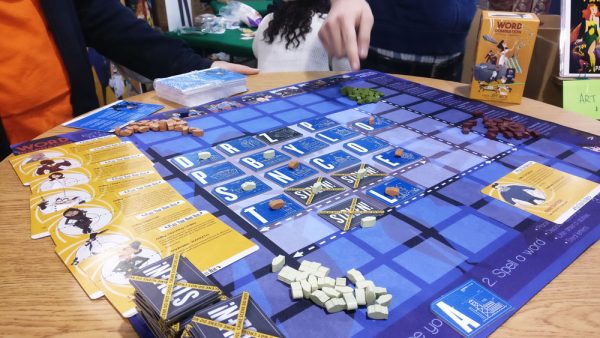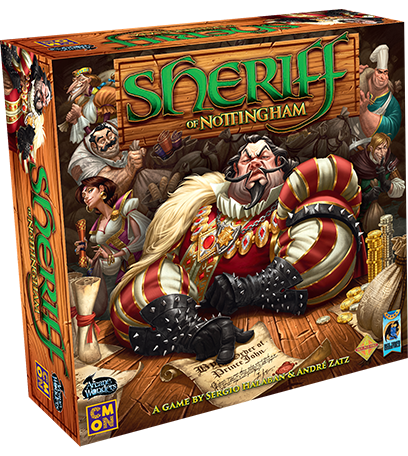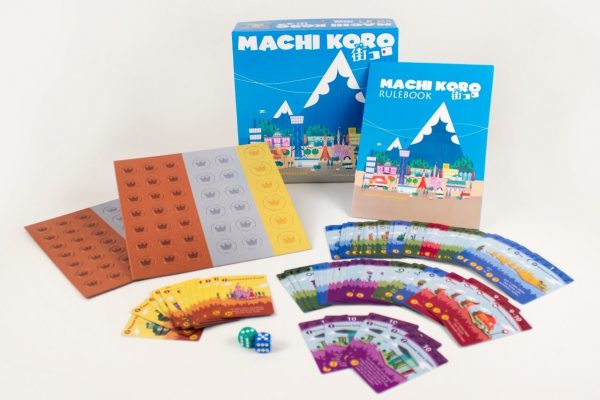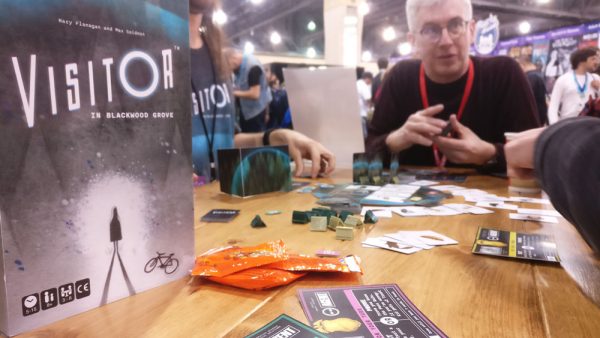Sign-up to our mailing list
The Best Gateway Board Games
 Board Games have had something of a renaissance recently. No longer are they chained to the connotations of basement dwelling-nerdom, but are (rightfully!) seen as a fun, accessible activity anybody can get into. Sure, some people may be more dedicated than others – but with the breadth of games now being developed, there will always be something to suit everyone.
Board Games have had something of a renaissance recently. No longer are they chained to the connotations of basement dwelling-nerdom, but are (rightfully!) seen as a fun, accessible activity anybody can get into. Sure, some people may be more dedicated than others – but with the breadth of games now being developed, there will always be something to suit everyone.
Nevertheless, there are still a few barriers stopping people from getting into board games. One of these is that some people think board games just aren’t for them. Another is the misconception that all board games are a complex, Go-like affair. Something only Spock – or someone dedicated enough to read an encyclopedic manual – would be able or want to get into.
The good news is that neither of these beliefs is true! There are so many different kinds of board games, at different levels of difficulty, that finding one to suit your own interests is totally possible. Of course, if you’re reading this blog post, were most likely preaching to the choir – but you may still be wondering which games could be best to introduce to your non-board-gaming friends.
We’ve put together our list of best gateway board games that will let new players dip their toe into the magical world of board games. (Bonus: they’re also great for non-beginners too!) And, since we were lucky enough to go to PAX Unplugged recently, we’ve also added some cool games we discovered whilst we were there.
Article Contents
1. Coup

To start with, we’ve picked a game that looks as approachable as possible: Coup. A compact little game, Coup is comprised of a set of character cards and coin tokens, and can be picked up in 5 minutes.
Here, the premise is that each person is the head of a family in a corrupt, feuding city-state. Everybody is trying to become the last remaining family by destroying the influence of all the others, which involves a lot of bluffing, deceit, and manipulation. So if you’re trying to convince people that board games can operate in tense, engaging and sneaky spaces, Coup is the game for you.
The actions you can take in the game are summarised on a small pocket-size sheet, and are easily memorable once you have played a round or two. Essentially, each of the five character cards you can draw allow you to do different things to gain the upper hand on your opponents – but since nobody knows which cards you hold, nobody would know if you’re lying about your cards and actions…right? Treading this line is what makes Coup the fun game it is. The rules are simple, but the tactics and teasing out of who is bluffing make it quickly immersive.
2. Word Domination
Word Domination is a game we played at PAX Unplugged and had to include on the list afterwards. In this word game, you’re trying to create the longest words possible in order to steal artefacts connected to different word tiles. But it’s not as simple as opening up a dictionary or pretending you’re at a spelling bee. You also need to be strategic about which letters you use in order to steal the most useful letters to you, thwart the schemes of your opponents, and canvass the board as your territory.
We got to chat a little to the game’s Lead Designer, Jeff Beck, and he aptly summed up why this is such a great game for board game newcomers (and veterans alike)! He highlighted that this is a game that’s great for those who have a fondness for word games like Scrabble, but is also combined with other modern board game abilities. For example, in Word Domination each character has their own unique ability, and certain letter tiles can grant a player other special abilities.
The fact that the basic mechanic is one that many are familiar with – spelling – but is built on in fun and manageable amounts, means that most new players won’t feel daunted by learning the rules. Plus, since winning the game doesn’t simply rely on spelling the longest or biggest amount of words possible, it’s not just those with the largest lexicons that win – there’s a nice blend of strategy that is crucial in there too.
3. Sheriff of Nottingham
In Sheriff of Nottingham, merchants are trying to move their goods into the city to sell. The Sheriff inspects those goods to make sure everything is above board, and everybody goes on their merry, totally non-corrupt way… right?
Not exactly. Whilst players do play the roles of merchants, it turns out that (surprise surprise) the most valuable goods are the contraband ones. Luckily, the Sheriff – a role every player gets to try out – doesn’t have the strictest moral compass, and can be persuaded (or bluffed to!) by other players to try and get things their way.
The main actions of the game are formed from players taking the cards they want to move into the city (say, 3 cheese cards, or 2 silk cards, for example) into a pouch and close it. They then declare what they (supposedly) have in their pouch to the Sheriff, who can choose to inspect the pouch contents, or let it through. If the Sheriff inspects it and finds the player was lying, the player pays them a penalty – if they find out the player was telling the truth, it’s the other way around.
It’s this negotiation stage between the Sheriff and the merchant that’s the most fun and interesting part of the game. Players can try and bribe the Sheriff, deny guilt, or direct the Sheriff’s attention towards another player – or something else, if they can think of it (and pull it off)! These interactions tend to be fairly amusing, even for those simply watching, especially if players get into ‘character’ of their merchant. This, combined with each player getting a turn being the Sheriff, means that the game does not stagnate or get dull for anyone, making it a straightforward but well-paced game for newbies to get into.
4. Beasts of Balance
Beasts of Balance is far from a traditional board game, but we feel it’s still a great one for boardgame newbies to step into the tabletop territory with. In the game, you stack physical artefacts and try to balance them all into a tower. At the same time, the game connects to an app which displays your digital world. This means any artefacts you place on the plinth will affect your digital world in some way. Thus you’re not only trying to balance all your pieces, but create the most high-scoring, fabulous digital world you can.
Though there are aims to the game – getting the highest score you can, and balancing all the pieces being the main ones – there is no ‘right’ or ‘wrong’ way to play the game, which is why we think it’s good for newbies. People who haven’t played many board games before can play in an exploratory way without being overly penalised by the game’s system, learning organically how to hone their own strategies as they continue to play.
On top of this, because there’s the digital element you can also see the actions of the physical pieces come to life in ways that aren’t always as powerful or easy to grasp in more abstract or traditional mediums. So if you’ve got people who enjoy digital games but they aren’t sure where to begin with board games, Beasts of Balance could be your perfect bridge game.
5. Weave
Another game we discovered at PAX Unplugged was the sleek, beautiful story-telling game, WEAVE. The game is composed of a neat little box of lovely cards and dice, along with a companion app you download to your phone – and the stories you can create by combining these in different ways is enormous.
From sci-fi to high school drama, WEAVE allows you and other players to create your own story, role-play as characters of your our creation, and save them to your app to pick up easily later. It’s made role-playing style games a lot less daunting to break into, and quicker to set up for everyone. Speaking to the creator Kyle, he explained:
‘Weave is perfect for a gamer who’s new to tabletop or storytelling for two main reasons; light ruleset and time.
Most roleplaying games take pride in having super “crunchy” rules, which is another way of saying quite a bit of rules. While these are great games, Weave introduces a light ruleset that can be entirely grasped in the first play-through.
The length of a play-through however, is what we consider to be our biggest achievement in accessibility. With Weave you can create a new character in minutes and they fit right into the world you chose to play in. The storyteller doesn’t have to worry about spending time “prepping” themselves either. All of the cards that get scanned at act as “story blocks” that you connect together to.. wait for it… weave your story.’
Having managed to set up a game in a quick lunch break with a cast of hilarious yet varied characters (we had a penniless, ninja, galaxy-truck driver!), we can agree that Weave is a brilliant game for newbies that are interested in exploring RPG style games but aren’t sure where to begin.
6. Machi Koro
This adorably charming city-building game is a light and delightful introduction into the world of board games. Each player is the mayor of a small-town (and we mean really small – think one wheat field and a bakery small) with big dreams, all racing to try and build up their cities before everyone else.
Using coins, players buy different establishments such as a ranch or a vegetable market, which in turn generate them more income. Once they have enough coins, they can go on to build landmarks. The first to build 4 wins the game.
If the game sounds easy to pick up, that’s because it is. Though each card generates income in different ways, and there is some light strategy in deciding which ones you buy next, Machi Koro is simple and quick to play. Nevertheless, Machi Koro’s simplicity is part of its beauty – from the cute card designs, to the Sim City-like pleasure of building up your own city, this is a light-hearted game that casual gamers and more experienced ones can both enjoy.
7. Visitor in Blackwood Grove
Last but not least, we have another game we played at PAX Unplugged. This one will likely be a hit with people who have been caught up in the Stranger Things-esque 80s nostalgia because of its premise and artwork.
Let us paint the scene: it’s the middle of the night, in Blackwood Grove, when something comes hurtling through the sky. It’s none other than an alien spacecraft – and in it is the Visitor. The only one there to see this is the Kid. But soon enough, Federal Agents get wind of the Visitor, and they get to the crash site too. So far, neither the Kid or the Agents can get through the space craft’s crushing force field – at least, not yet…
The Visitor is working with the Kid to try and help them figure out the rule of the force field, so that the Kid can help the Visitor escape. But the Federal Agents are also trying to figure out the rule, and if they figure it out first, the Visitor has just become their latest surgery table centerpiece.
As this set-up indicates, each player takes on a role – one Kid, one Visitor, and a number of Agents. Interestingly, although the Visitor and the Kid are a team, each Federal Agent is working on their own, so this introduces a fun mix of dynamics that can be tried out across different rounds of the game. The rule the Visitor makes up can be whatever they like (‘all cards must have the colour red in them’, for example), which provides a simple and fun level of creativity for newbies to play with. The catch is that the rule cannot be too obvious, because this could let the Federal Agents guess it before the Kid.
We feel this would be a good gateway game not just because it is quick to set up, but also because it is easy to pick up as you play. If a more experienced player takes on the role of the Visitor, the roles of the Kid and Federal Agents are easy to fall into – and by the time a first round has been played, the others will understand the game well enough to be able to play as the Visitor too!
This sums up our list of best gateway board games – if you want to keep up with more board game articles, news, and offers on Beasts of Balance, make sure to sign up for our mailing list below.


